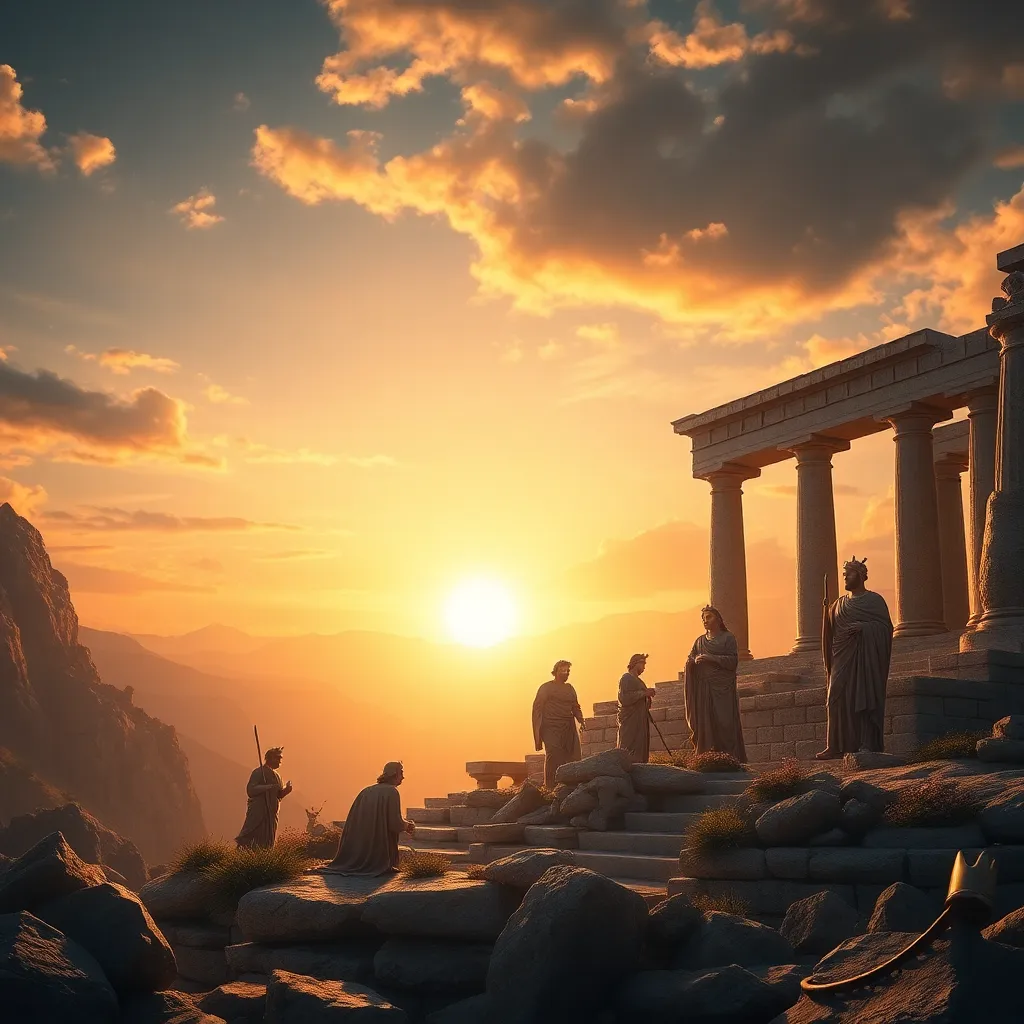The Myths Surrounding the Birth of the Olympian Gods
I. Introduction
Greek mythology presents a rich tapestry of stories that have captivated minds for centuries. At the center of these tales are the Olympian gods, a pantheon of deities that played pivotal roles in ancient Greek culture and religion. Understanding the origins of these gods is crucial for grasping the values, beliefs, and narratives that shaped Greek society.
This article aims to debunk common myths and clarify the truths surrounding the birth of the Olympian gods, providing insights into their significance and the complexities of their stories.
II. The Primordial Deities: The Foundations of Creation
The tale of the Olympian gods begins with the primordial deities, the first beings to emerge at the dawn of creation. Among these are:
- Chaos: The void or nothingness from which all things originated.
- Gaia: The Earth, personified as a goddess, who is both a nurturing mother and a powerful force.
- Uranus: The sky, who represented the heavens and fathered many of the Titans.
These primordial deities set the stage for the birth of the Olympians. Gaia and Uranus, in particular, played crucial roles in the creation of the Titans, who would later become the parents of the Olympian gods. However, there are common misconceptions about the influence of these primordial deities, particularly the belief that they directly governed the actions of the Olympians. In truth, they are more accurately seen as the foundational figures of Greek cosmology.
III. The Titan Generation: Parents of the Olympians
The Titans were the second generation of divine beings, notable for their immense power and significance in Greek mythology. Key Titans include:
- Cronus: The leader of the Titans who overthrew his father, Uranus.
- Rhea: The sister and wife of Cronus, known as the mother of the Olympians.
The marriage of Cronus and Rhea was pivotal in the birth of the Olympian gods. According to myth, Cronus feared that one of his children would overthrow him, as he had done to his father. This fear led him to swallow each of his children at birth, believing it would prevent the prophecy from coming true. However, Rhea managed to save her youngest child, Zeus, by hiding him away in a cave on Crete, leading to a series of myths regarding the order of birth and the fate of their children.
IV. The Prophecy and the Overthrow of Cronus
The prophecy that haunted Cronus was a significant driving force behind his actions. It foretold that one of his children would rise up against him. In an attempt to thwart this prophecy, Cronus swallowed his offspring:
- Hestia
- Demeter
- Hera
- Hades
- Poseidon
However, when Zeus grew up, he returned to free his siblings from Cronus’s stomach, leading to a climactic battle known as the Titanomachy. There is often misunderstanding surrounding Cronus’ motivations; while many view him as purely tyrannical, his actions stemmed from fear and the desire to maintain power, which reflects a deeper theme of fate versus free will in mythology.
V. The Birth of Key Olympians
The births of the key Olympian gods are marked by unique and often miraculous events. The most notable among them include:
- Zeus: Hidden away by Rhea, he was raised in secrecy and returned to challenge Cronus.
- Hera: Born from Rhea, she later became the queen of the gods.
- Poseidon: The god of the sea, he wielded a powerful trident.
These births are often accompanied by divine interventions and miraculous events, such as the nurturing of Zeus by the nymphs and the involvement of other gods. The symbolic meanings behind their births reflect themes of rebirth, power, and the cyclical nature of life and death.
VI. The Role of Fate and Destiny in Olympian Origins
Central to many myths surrounding the Olympian gods is the concept of the Moirai, or Fates. These three goddesses control the thread of life for all beings, dictating their destinies. The interplay between free will and fate is a recurring theme, as even the gods themselves are subject to the whims of destiny.
Understanding the role of fate in these myths adds depth to the narratives of the Olympians. It raises questions about the nature of power, choice, and the inevitability of fate, enriching the cultural heritage of Greek mythology.
VII. Cultural Interpretations and Variations of the Myths
The myths surrounding the Olympian births have been interpreted differently across various regions of Greece, leading to a rich tapestry of stories. Factors influencing these interpretations include:
- Regional Differences: Various city-states had their own versions of the myths, emphasizing different gods and attributes.
- Historical Context: Changes in political and social structures influenced how myths were told and understood.
- Artistic Representations: Throughout history, artists have depicted the myths in ways that reflect their contemporary values and beliefs.
These variations demonstrate the fluid nature of mythology, as stories evolve and adapt to the cultures that tell them.
VIII. Conclusion
In summary, the birth of the Olympian gods is a complex narrative woven with themes of power, fate, and the very essence of existence. From the primordial deities to the Titan generation and the eventual rise of the Olympians, each layer of the mythology reveals deeper truths about human nature and the cosmos.
The ongoing fascination with the Olympian gods reflects their timeless relevance in understanding cultural heritage. By exploring these myths, we gain insights not only into ancient beliefs but also into the universal themes that continue to resonate today. Understanding these origins is crucial for appreciating the rich legacy of Greek mythology and its influence on modern storytelling and art.




